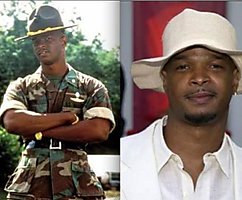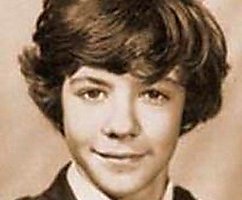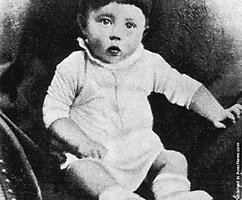Psihogenealogiya how your name and deceased relatives can influence your life
 Bashny.Net
Bashny.Net
Family travmyZnaete Do you think of your grandfather and psihotravm matter what name you call your parents, largely depends on what is going on with you today? Psihogenealogiya explains the nature of this relationship.
Choosing eminent, who are already familiar with psihogenealogiey and is going to study in detail the story of his family in order to find parallels with his own life, to start is to know under what circumstances you got your name. Most often, parents name their child after his own father or mother, by the name of a dead child, or a relative of his idol and former lover / mistress.
It's unbelievable, but many experienced therapists will tell you that at some point in psychotherapy patient suddenly begins to remember his dead relatives (such as brothers, sisters and so on. D.), After whom it was named. And consciously or unconsciously draw an analogy with your life as if living the life of the man himself (at least partially).
In fact it is not so difficult to explain. Psychologists have known for the phenomenon of so-called psychological promise that unconsciously give parents their children. About him we'll talk later, but one of those unconscious sends is just the choice of name. Parents like to "talk" to your child (without words, of course): "We want you to be such as a deceased relative, the man whom we admire, whose love of which we remember." Despite the good intentions of parents, it can even break down their child's life or just to stop him in anything - from career to family life.
All the nuances of this process is difficult to explain in one article, so we refer you to the book the famous therapist Anne Ancelin Schutzenberger "Psihogenealogiya. How to heal family wounds and find himself ", as well as the cycle of video of Alexander Gordon psychologist Olga Troitskaya" happily ever after. Everything about the man, the woman and the family ».
Silent transmission experienced «Pictures of past traumas, both personal and family, can be transmitted from generation to generation, for example in the form of nightmares, as well as accidents, unexpected place in the special importance of the date strong > » h4> If you're not a psychologist, but are interested in this path, know that the most severe psychological trauma is what silent. And the family is often silent. So it is accepted, "Why raise unpleasant topics." Many people sincerely believe that if something is not talking and not "think" it will no longer worry. But the point is just that painful subject not only cease to trouble - it will become a much more formidable scale than it was at the beginning. Often this silence leads to a pathological repetition of similar fate many generations in a row ("women of the family are always married for alcoholics - this is our cross, so we were not lucky") or to the disease, which can not even cure doctors, although the person on the fifth circle can pass numerous examinations. Experienced doctors, by the way, in such cases, send the patient to a therapist, realizing that we are talking about psychosomatic diseases, but not all, patients come to him, and everything starts over again. About psychosomatic diseases and their causes, see the cycle of our articles: "psychosomatic illness", "Psychosomatics Whence disease feet grow", "Psychosomatics: anyone that hurts" and "Psychosomatics: atopic dermatitis, cancer, and all-all-all" .
Choosing eminent, who are already familiar with psihogenealogiey and is going to study in detail the story of his family in order to find parallels with his own life, to start is to know under what circumstances you got your name. Most often, parents name their child after his own father or mother, by the name of a dead child, or a relative of his idol and former lover / mistress.
It's unbelievable, but many experienced therapists will tell you that at some point in psychotherapy patient suddenly begins to remember his dead relatives (such as brothers, sisters and so on. D.), After whom it was named. And consciously or unconsciously draw an analogy with your life as if living the life of the man himself (at least partially).
In fact it is not so difficult to explain. Psychologists have known for the phenomenon of so-called psychological promise that unconsciously give parents their children. About him we'll talk later, but one of those unconscious sends is just the choice of name. Parents like to "talk" to your child (without words, of course): "We want you to be such as a deceased relative, the man whom we admire, whose love of which we remember." Despite the good intentions of parents, it can even break down their child's life or just to stop him in anything - from career to family life.
All the nuances of this process is difficult to explain in one article, so we refer you to the book the famous therapist Anne Ancelin Schutzenberger "Psihogenealogiya. How to heal family wounds and find himself ", as well as the cycle of video of Alexander Gordon psychologist Olga Troitskaya" happily ever after. Everything about the man, the woman and the family ».
Silent transmission experienced
«Pictures of past traumas, both personal and family, can be transmitted from generation to generation, for example in the form of nightmares, as well as accidents, unexpected place in the special importance of the date strong > » h4> If you're not a psychologist, but are interested in this path, know that the most severe psychological trauma is what silent. And the family is often silent. So it is accepted, "Why raise unpleasant topics." Many people sincerely believe that if something is not talking and not "think" it will no longer worry. But the point is just that painful subject not only cease to trouble - it will become a much more formidable scale than it was at the beginning. Often this silence leads to a pathological repetition of similar fate many generations in a row ("women of the family are always married for alcoholics - this is our cross, so we were not lucky") or to the disease, which can not even cure doctors, although the person on the fifth circle can pass numerous examinations. Experienced doctors, by the way, in such cases, send the patient to a therapist, realizing that we are talking about psychosomatic diseases, but not all, patients come to him, and everything starts over again. About psychosomatic diseases and their causes, see the cycle of our articles: "psychosomatic illness", "Psychosomatics Whence disease feet grow", "Psychosomatics: anyone that hurts" and "Psychosomatics: atopic dermatitis, cancer, and all-all-all" .
It's not luck or no, and in the hidden "script", unknowingly embedded in us by our parents, and they - their parents and so on. D. The question is not only that "the child learns what he sees" - often much more complicated.
"Pictures of past injuries, both personal and family, can be transmitted from generation to generation, for example in the form of nightmares, as well as accidents, unexpected place in the special importance (for a specific family - Ed.) Date", - writes Ann Anselin Schutzenberger.
Imperfect traurDetey decided to cheat when one of their loved adult dies, well, or at least not to take to the funeral ("Why the child to look at it"). If unenlightened gooders know what kind of injury they inflict so the child, then surely we would have given up such practices.
The loss, which would be a terrible and unbearable it may be, have to be mourned by (literally), it is necessary to talk about it with your child. To tell you simply and quietly, without embellishment, unnecessary comforts, you must be with your child - not only physically, but also mentally, to be considerate and sensitive to his state of mind. A child needs to accept the death of a loved one, and this requires a natural "work of mourning." Only then neither he nor his children and grandchildren will not have problems with this unmourned loss.
Ann Anselin Schutzenberger "When mourning is not perfect, is interrupted," unfinished operations, "which makes a man and his descendants" wander "(just as saying that roams the dough or wine).
The same can be said about "family secrets" and similar "secret" things. Adopted by, for example, report adopted child (if parents took him out of the children's home of the baby), he adopted. Such terrible harm can not be underestimated. If you are willing to take the baby from the orphanage, be sure to tell him that he was not home, but add that for you it does not matter and that you love him like a brother (but only if this is true. If you honest enough with themselves and feel that it is not so - do not lie: that you will deal more damage). To talk on such topics with the child should be calm and confident. About family trauma, read our interview with the psychoanalyst Love Zaeva "Fathers, children and historical trauma».
Double prinuzhdenieIli double message. It is the bane of almost all (with few exceptions), and grown children are adults. "I remember a classic case of double compulsion mother offers her son two shirts for a birthday - says Anne Schutzenberger. - The next day, the son puts on one of them (blue), and his mother pushes - he does not like his mother, because he did not put another (green). When he puts on the green, the mother pushes him again - he does not like his mother, because he did not put the blue. And when the son puts on a shirt, both one on another, the mother exclaims: My son is - crazy! »
Such promises we observe every day everywhere. When a father makes his son to be obedient and do not cry when he scolded - and at the same time learn to hit back the boys in the yard, "You're the man!" When a mother says to her daughter: "Where are dressed up!", "You have to lose weight / nose smaller / bigger eyes / hair thicker, and so on. "and then complains that her daughter" is still not married, "she behaves" like a man "and so on. d.
Especially often such parental message: "Do not live (do not be)" (if you're not ...; before you were born ... (a story about something good), after you were born ... (a story about something bad) and we wanted a boy and you are born (and vice versa) and so on. n.) "Do not grow (do not be an adult)" (small children are so good !; "I love little kids, little kids are all good, but then ...; we Dad wanted a divorce, but decided to wait until you grow up, my mother will love you if you'll be there with my mother, and so on. n.) "Do not be a" (we want a healthy baby, but you were born; we wanted a girl, but you were born, we are experiencing the death of the first child and decided to have another), "Do not be happy" (a situation where the parents asserting the child about how they have suffered in order to grow it / put / feed / to give him an education. The child, realizing that for him as suffering, feels guilty, but to repay the "debt" can not. So be happy he did not, a situation when a child is being ill, gets much more love and attention than when he is healthy - in the future he may unknowingly be sick, to be loved), and so on. d. - parental messages are vast. To learn more about them here.
via naked-science.ru/article/psy/psikhogenealogiya-i-semeinye-t
Tags
See also
Psychokinesiology: what is Your name and Your ancestors affect Your life
Vadim Zeland: as your negative attitude can ruin your life
James Altucher: How to become a master in any case
How to choose a baby name?
As a birthday influence the nature RIGHTS
Stunning 60 "hacks" of the brain that will make your life better
Richard Davidson: How do your emotions controlled by the brain
Karmic CODE OF YOUR LIFE
Do not shout, and then the police arrest you! — We SCARE children
"Easy silence and listening can change your life": an interview with David toop
















